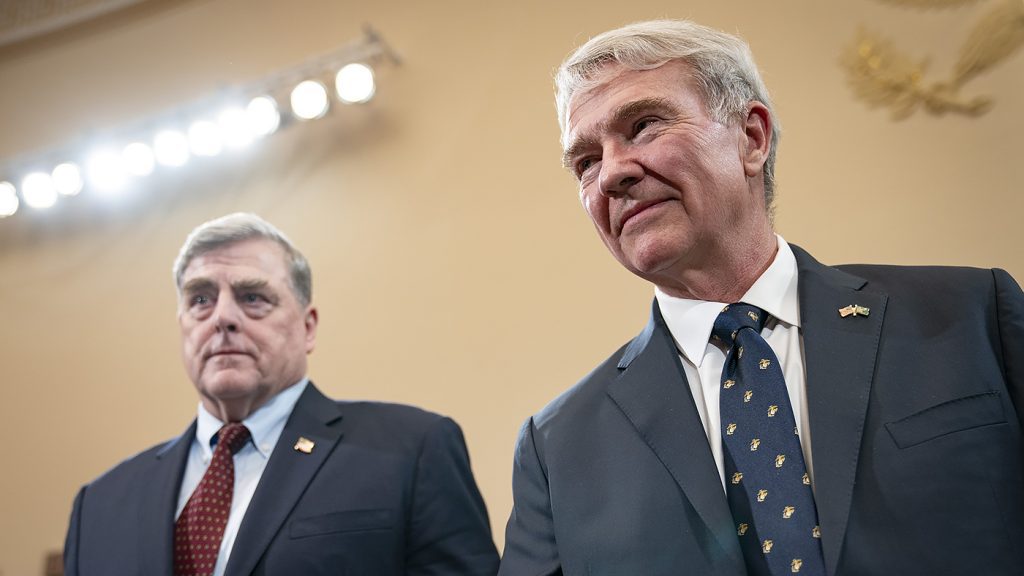Two of America’s highest-ranking retired generals told a committee on Tuesday that mistakes during 20 years of war led to the chaotic withdrawal from Afghanistan in August 2021. They also admitted that the Biden administration made multiple mistakes.
Gen. Mark Milley, former chair of the Joint Chiefs of Staff, and Gen. Kenneth McKenzie, former head of U.S. Central Command, spoke before the House Foreign Affairs Committee. Gold Star families, relatives of the 13 American service members who died during the withdrawal, were seated behind them.
Republicans on the committee criticized the Biden administration for the disastrous withdrawal, while Democratic lawmakers emphasized that the Afghanistan retreat should be seen in the context of 20 years of decisions across various administrations.
Milley, speaking to Congress for the first time since leaving his role as the highest-ranking military official last fall, said decisions made during years of war resulted in the 2021 collapse of the Afghan government as the Taliban took power after the American retreat.
Milley said, “The entire situation was a strategic failure,” although he praised the U.S. military for fulfilling its duty.
Milley criticized the Biden administration for what he called a poorly timed Noncombatant Evacuation Operations (NEO), which did not occur until mid-August, a little over two weeks before the deadline to leave.
“The fundamental mistake, fundamental flaw was the timing,” Milley said. “I think that was too slow and too late. And that then caused a series of events that led to the very last couple of days. There were many other mistakes made along the way, but I think that was the key.”
Milley also said that the U.S. lacked proper intelligence gathering before the withdrawal due to the reduction of troops leading up to it.
“We blinded ourselves,” he said, noting that the U.S. relied on electronic intelligence leading up to the withdrawal. “But technology can’t read a person’s heart, they can’t see the negotiation that’s going on locally [and] we lost our ability to really sense that environment.”
Both Milley and McKenzie had suggested that the U.S. keep a small presence of about 2,500 troops in Afghanistan, but President Biden decided for a complete withdrawal by the end of August.
The departure of U.S. troops created a gap in the country that the Taliban quickly filled, despite the U.S. spending years training Afghan security forces. Afghan forces collapsed as the president and his Cabinet fled, allowing the Taliban to take control within days.
While some estimates indicated the Afghan government would fall in 24 months, the military thought it could happen as soon as the fall, but did not predict a collapse in summer 2021, according to Milley and McKenzie.
“We depended on Afghan support to maintain the perimeter. That disappeared,” McKenzie said. “And that was probably the most significant immediate operational effect.”
According to Milley, the U.S. did not succeed in training Afghan security forces, and this failure was due to a series of decisions dating back to the early 2000s.
He told the committee that a long history of decisions led to the collapse of the Afghan security forces when faced with strong pressure from the Taliban.
Republican lawmakers spent a lot of time criticizing the Biden administration for the chaotic withdrawal from Afghanistan, which was shown in images of people desperately trying to leave Kabul airport.
On Aug. 26, 2021, just before the U.S. deadline to withdraw from Afghanistan, an ISIS-K suicide bomber attacked Abbey Gate at the airport, resulting in the death of 13 American troops and 170 Afghans.
Rep. Ann Wagner (R-Mo.) said the Biden administration's withdrawal from Afghanistan has had a global impact.
She stated, “American communities are now less safe, and the world is much more dangerous and unstable. We are now experiencing conflicts in every part of the world.”
However, Democrats defended the Biden administration and pointed to the Doha agreements signed in 2020 under the Trump administration as the starting point of the events.
Former President Trump decreased troop levels to about 2,500 in January 2021 as Biden took office. In April 2021, Biden indicated that a full withdrawal needed to happen by the end of August.
Rep. Gregory Meeks (D-N.Y.), the ranking member of the House Foreign Affairs Committee, argued that the withdrawal was already in progress when Biden took office.
Meeks stated, “We should be transparent with the American people about everything that happened during the 20 years in Afghanistan, not just one aspect. If we are serious and not playing politics with this issue.”
The White House has shifted the blame for the Afghanistan withdrawal, largely attributing it to the Trump administration in a report last year.
Retired Marine Sgt. Tyler Vargas-Andrews, who appeared at the hearing, testified to Congress that he had identified the suicide bomber before the explosion at Abbey Gate, but was unable to confirm if he could engage the target when he reported it up the chain of command.
These claims from Vargas-Andrews led to an investigation by the House Armed Services Committee, but relevant documents have not been provided yet, according to Rep. Michael McCaul (R-Texas), chair of the House Foreign Affairs Committee.
Milley told lawmakers that he was not aware of the situation involving Vargas-Andrews, but mentioned that the rules of engagement allow for the identification and engagement of a hostile target.
He stated, “Every soldier, sailor, airman, marine, ship’s captain, or fighter pilot has the right to self-defense and does not need to seek permission.”
McKenzie also raised doubts about Vargas-Andrews's account, mentioning that there were many threats on that day.
Rep. Cory Mills (R-Fla.) criticized McKenzie, saying he was trying to discredit Vargas-Andrews's story.
“It’s disgraceful,” Mills commented.
Some lawmakers also questioned if the U.S. could have conducted a better evacuation if they had used Bagram airbase, which American forces withdrew from in July.
McKenzie said they couldn't have used Bagram for evacuations due to the troop levels they were operating with at the time.
In the end, the U.S. withdrawal caused Afghanistan to fall back into a humanitarian crisis, with the Taliban reintroducing harsh conditions in the country. The U.S. also left approximately $80 billion worth of equipment and supplies in the country and was unable to evacuate everyone, including some Americans, although the exact number of U.S. citizens left behind is unknown.
A State Department After Action Report last year identified shortcomings in both the Biden and Trump administrations' plans for the withdrawal.
McCaul, who began his investigation of the Afghanistan withdrawal in January 2023, stated that Gold Star families and the American people deserve accountability for what he has described as a failed evacuation that will affect Americans “for generations.”
“I believe that accountability ensures mistakes of the past are not repeated,” he said. “I launched this investigation to make sure that the mistakes made in Afghanistan never ever happen again.”









